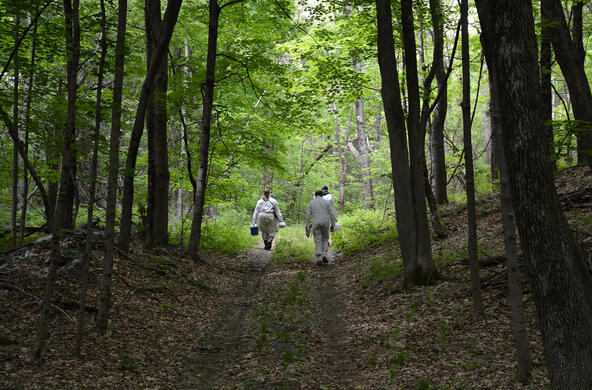It’s a tough time to be an amphibian. Countless millions of frogs, toads and salamanders around the world are dying from two emerging diseases. The first plague appeared in the 1990s, and is so deadly to amphibians (especially frogs) that it is causing “the most spectacular loss of vertebrate biodiversity due to disease in recorded history.”
Now, a second fungal disease has turned up in Europe. This disease kills many kinds of salamanders, including the red-spotted newt and eft that is so common here in the Northeast. This new salamander disease probably will move to North America, too, if we continue business as usual.
It’s ironic that these terrible diseases are being spread by some of the people who most love amphibians. Although the export of frogs for food and medical purposes was important in the origin and spread of these diseases, both of them appear to be moving in the inadequately regulated pet trade.
People who like frogs, toads and salamanders don’t just keep tadpoles from their local pond any more, but animals from all around the world. And the number of imported animals is staggering: it was recently estimated that importers brought 200 million live animals a year into the U.S. for pets, 4 million of them amphibians. Not surprisingly, few of these animals are adequately inspected, many are misidentified and some carry disease.
Why do we care if amphibians die? Well, first, amphibians are an interesting part of life on earth, so we may simply miss them when they disappear. I know that I would miss seeing efts trundling over the forest floor. Second, at least some people think we have a responsibility to be a good stewards for the Earth and its life, which would not include killing off its amphibians. Third, it is likely that amphibians play important roles in ecosystems globally, even if those roles are not yet well understood. Here in our northeastern forests, there can be as many salamanders (by weight) as birds or mammals, so they must have a prominent role in the food web.
So these losses make the world a poorer place, and change the world’s ecosystems in ways we don’t understand. And what benefits did we receive in exchange for these losses and risks? A cure for cancer? World peace? No, it just costs a little less to buy exotic pets. Really? I don’t know about you, but I want a better price if I’m going to sell the natural heritage of my planet.
These amphibian diseases are only part of the cost of a carelessly run pet trade. The pet trade brought us Burmese pythons for the Everglades, snakehead fish for the Potomac, and a thousand other problems and diseases of humans as well as wildlife (who remembers monkeypox?).
And at the core of all of these cases, there is what seems to me to be a fundamental unfairness. The pet industry engages in risky or careless practices so it can increase profits and offer cheaper pets to the few people who want exotic pets. In contrast, when problems inevitably arise, all of us pay, either through our tax dollars or the loss of our shared natural resources.
Here are some things we could do to fix the problems caused by the pet trade.
1. Make it illegal to import any species until independent scientific studies show that it is unlikely to cause ecological, economic, or health problems if released into the wild.
2. Insist that shipments of live animals from outside the U.S. be inspected by an independent agency, paid for by the industry, to verify that animals being shipped are correctly identified and free of disease. Violators should receive stiff fines and sanctions.
3. Provide better education for pet owners of all types so that they understand that releasing unwanted pets into the wild is a reckless and irresponsible act akin to tossing a lighted match into a dry forest.
4. Offer shelters for all unwanted pets, not just cats and dogs, where they can be re-adopted or humanely destroyed, so that pet owners have a good alternative to releasing unwanted pets into the wild.
In the meantime, you may want to ask your congressperson where they stand on H.R. 996, a stalled attempt to address these problems.







